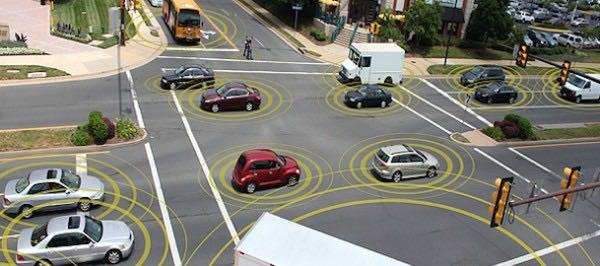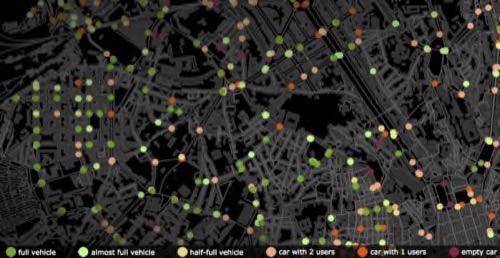Guest author Amber Case is an entrepreneur, author, speaker and researcher who helps Fortune 500 companies design, build, and think through their roadmap for connected devices. She is the cofounder and former CEO of Geoloqi, a location-based software company acquired by Esri in 2012.
Tesla announced its first self-driving cars this summer, while Apple is rumored to be getting into the self-driving car business. Even if there’s no iCar in our immediate future, we need to start talking about the dramatic changes self-driving cars likely have in store for us—not just in the way they’re built and sold, but also in the way they’ll change our lifestyles and everyday habits.
To help start that conversation, let’s consider the four likely scenarios that are likely to emerge in the next decade or two.
Cars Will Become Live/Work Spaces

Car interiors will become more and more like living rooms, or even bedrooms. Didn’t get enough sleep the night before? You’ll be able to sleep on your way to work.
Consequently, the most sought-after features will not be powerful engines, but quiet rides with good suspension, and built-in outlets/nooks for our laptops and handhelds. (Anti-reflective glass will also have a high premium, as it helps limit excess glare on our device screens.)
High-quality speaker systems will become even more important, not just for music, but for teleconferencing and phone calls. Connectivity will become essential for everyone who works from their cars, so also expect to see car-based wireless and network plans offered by carriers and wifi-providers, possibly bundled into our existing home and mobile plans.
Self-Driven Cars Will Lead to New Businesses
Self-driving cars will open up new business models and self-employment opportunities. On your way into town? Save on gas or electricity by dropping off a package on the way, or opt to take advertiser-sponsored trips. And speaking of ads, consider how self-driving cars will increase our time in front of screens.
See also: How Self-Driving Cars Could Radically Transform Cities
People will view 30-40% more ads as commutes become our preferred space to work. This will increase ad impressions and app purchases, and probably help pay for the costs to develop and distribute cars. (And on the downside, increase challenges around media addiction.)
Drive-thrus will probably become more diverse and high-end, as we gain more time and freedom to savor meals on the road.
Self-Driven Vehicles Will Create a New Car Culture
As cars become a place to be lived in, versus a space that’s merely tolerated between point A and B, a lifestyle and culture will grow around them.
Given access to regular showers, many of us will begin to live almost entirely out of our cars. Gyms may see an uptick in subscriptions because of their showers alone, and companies will offer showers and spas as work benefits.
There may be entire parking lots dedicated to live-in cars, with showers, restrooms, and food/laundry services nearby.
Road trips will likely increase, as families become better equipped to take pleasant trips together, often sitting in silence, connected to our devices. Self-driving cars owners will be able to subscribe to custom-made tours created by others; they may even come with “get lost” or “I’m stressed by the city, take me somewhere nice” modes.
Where previous generations used cars for make-out sessions at drive-in theaters, the next generation will probably want to hook up while their cars are driving.
We’ll Argue Over Automated Traffic Fatalities—and Our Humanity

While self-driving cars will help prevent hundreds of thousands of unnecessary deaths from drunk driving and other road mishaps, no automated system is perfect.
The first fatality due to computerized vehicles will spark great debate. For some, this will be a sign of our waning humanity. What machine has the right to make a decision over a human life?
Then again, the first car accidents in the early 20th century also provoked concerns over rising mechanization. What is bizarre at first can quickly become a cultural norm. Even so, there’s no doubt we’ll see yet another decline in self-sufficiency. For teens, learning to drive is a rite of passage, a mark of coming adulthood. But how long will it be before driver’s licenses are a thing of the past?
These forecasts only touch the surface of the controversies we’ll soon face—issues over privacy, safety, and hacking will also have to be dealt with. And while it’s not yet known how different our driverless future will ultimately be, it’s certain we’re not yet prepared to deal with it.
Lead photo by zeitfaenger.at; courtesy of Institute of Technology in Massachusetts





